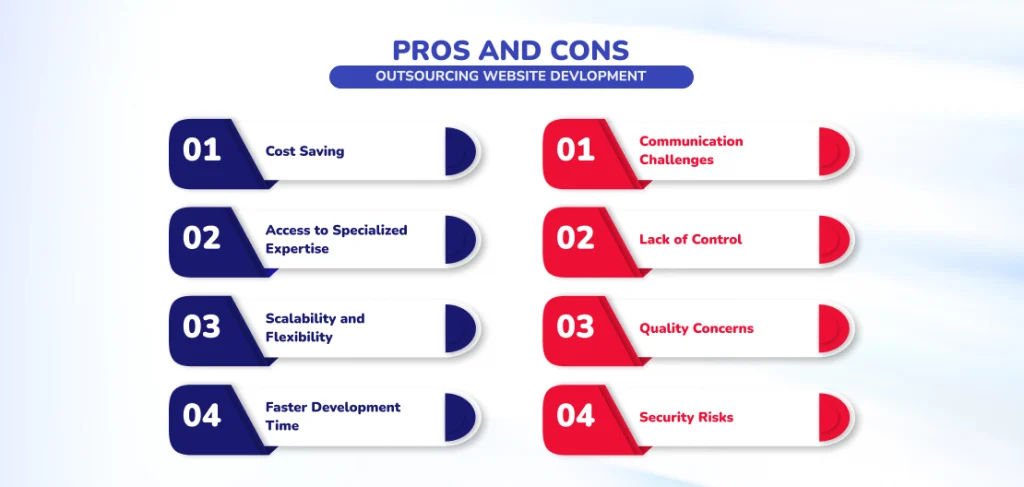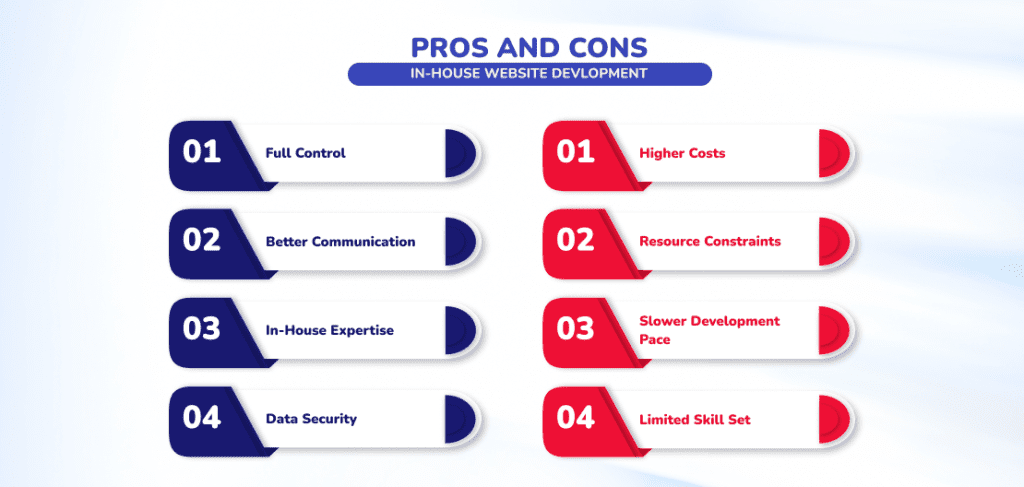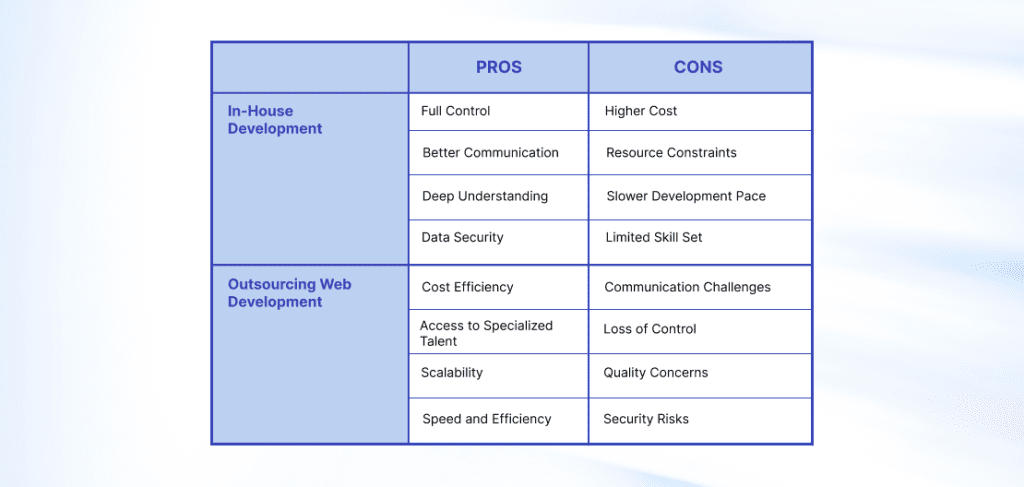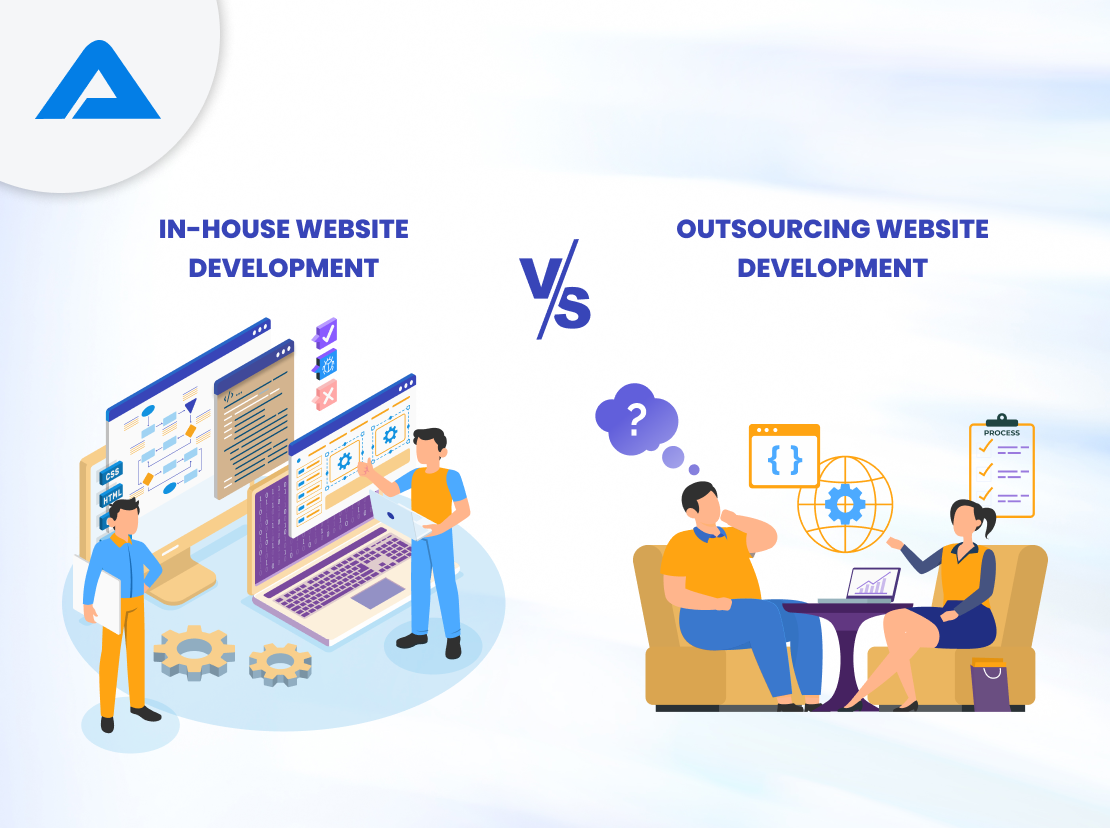In the dynamic landscape of business today, web development has become a pivotal driver of success. Websites are digital storefronts that represent a company’s brand and serve as powerful tools for engaging with customers, driving sales, and expanding market reach. As the virtual gateway to your business, developing your website is a decision of paramount importance.
The purpose of this project is to explore the choices available to businesses when it comes to developing their online presence. Specifically, we aim to delve into the merits and drawbacks of two primary approaches: outsourcing website development services and opting for in-house development teams.
In a world where the digital realm continually evolves and competition intensifies, choosing between outsourcing and keeping web development in-house can have profound implications for a company’s bottom line, agility, and customer experience. We seek to provide invaluable insights into this critical decision-making process by shedding light on the advantages and disadvantages inherent to each approach.
So, join us as we navigate the complex landscape of website development services and empower you to make informed decisions that will shape your organization’s digital future.
What is Website Development Outsourcing?
In the ever-expanding digital age, businesses worldwide continually seek ways to establish and enhance their online presence. This quest for a robust digital foothold has given rise to a practice known as Outsourcing Web Development.
Outsourcing Web Development involves a strategic decision made by organizations to entrust the design, development, and maintenance of their websites to external service providers or agencies. Rather than handling these tasks in-house, businesses collaborate with specialized professionals with the expertise and experience required to create a compelling online platform.
This approach allows companies to leverage the skills and resources of experts in the field, often located in different geographical regions, to achieve their digital objectives. It can encompass various services, including website design, coding, content creation, and ongoing technical support.
Outsourcing Web Development enables businesses to focus on their core competencies while relying on dedicated professionals to craft and maintain their digital storefronts. It’s a strategic move that can lead to cost savings, faster development times, access to specialized knowledge, and a more robust online presence. However, like any business strategy, it comes with its own challenges and considerations that must be carefully weighed before deciding to outsource website development services.
Pros and Cons of Outsourcing

Pros of Outsourcing
1. Cost Savings: Outsourcing website development services often prove cost-effective. By collaborating with external experts, businesses can avoid the expenses associated with hiring and maintaining an in-house team, such as salaries, benefits, and infrastructure costs.
2. Access to Specialized Expertise: Outsourcing allows access to a broader pool of specialized talents. Businesses can partner with agencies or professionals with specific skills and experiences, ensuring that their project is in the hands of experts.
3. Scalability and Flexibility: Outsourcing offers the adaptability to adjust resource levels as required, either increasing or decreasing them. This adaptability is especially valuable for businesses with fluctuating workloads or short-term projects.
4. Faster Development Time: External web development teams are often more efficient due to their experience, and streamlined processes can lead to faster project completion, allowing businesses to launch their websites sooner and gain a competitive edge.
Cons of Outsourcing
1. Communication Challenges: Collaboration with remote teams or third-party agencies can introduce communication barriers, such as time zone differences, language issues, and cultural nuances. Effective communication becomes crucial to prevent misunderstandings and delays.
2. Lack of Control: Businesses may have limited control over the development process when outsourcing. They must rely on the outsourced team to make critical decisions, which can be challenging for those who prefer a more hands-on approach.
3. Quality Concerns: Ensuring the quality of work from an external provider can be a concern. Without direct oversight, businesses may encounter issues with the final product not meeting their standards or expectations.
4. Security Risks: Sharing sensitive data and information with external parties can pose security risks. Businesses must take extra precautions to protect their data and ensure that the outsourced web development team follows strict security protocols.
When Should You Consider Website Development Outsourcing?
In the ever-evolving landscape of digital business, the decision to engage Outsourced Web Development Services can be a strategic move that holds the potential to benefit your organization significantly. Let’s explore critical scenarios when outsourcing website development becomes a compelling choice:
- You’re not specialized in software development: If software development isn’t your organization’s core expertise, outsourcing becomes an attractive option. By entrusting this critical task to professionals specializing in it, you ensure that your website is crafted with precision and the latest industry standards.
- Budget limitations: Operating within a constrained budget is a common challenge for many businesses. Outsourcing offers a cost-effective solution by eliminating the need to invest in hiring, training, and maintaining an in-house development team. You can access top-tier talent without the financial burden of full-time employees.
- Shortage of expertise: Sometimes, your in-house talent pool lacks the specific skills required for your web development project. Outsourcing allows you to tap into a vast network of skilled professionals, ensuring your project is in capable hands.
- Short time limits: When time is of the essence, and you need to get your website up and running swiftly, outsourcing is a game-changer. Experienced external teams can work efficiently, meeting tight deadlines and getting your web presence live in record time.
By recognizing these scenarios and leveraging Outsourced Web Development Services, your organization can enhance its digital capabilities, maintain fiscal prudence, access specialized talent, and meet critical project timelines effectively. It’s a strategic decision that can empower your business to thrive in the competitive digital landscape.
Related Article: How to Develop A Small Business Website in 2023? A Complete Step-by-Step Guide
What Is In-House Website Development?
In the realm of digital innovation, in-house Website Development is a strategy that places the creation and maintenance of your online presence firmly within the grasp of your organization, which means that you hire web developers in New Jersey who become an integral part of your in-house team rather than seeking external assistance.
In-house website Development involves establishing a dedicated team of web developers, designers, and other professionals who work exclusively on your web projects. These individuals become intimately familiar with your brand, objectives, and values, which can lead to a more tailored and cohesive online presence.
This approach allows direct control over your website’s development, from design and functionality to security and updates. It can be an ideal choice when you require absolute control over the development process and seek a web presence that closely aligns with your organizational vision.
However, it’s important to note that In-House Website Development comes with challenges, including higher costs, resource management, and potential limitations in skill sets. Organizations need to carefully evaluate their needs and resources to determine if this approach is the right fit for their web development endeavours.
Pros and Cons of In-House Development

Pros of In-House Development
1. Full Control: With an in-house web development team, you maintain complete control over every aspect of your project. This level of oversight allows you to ensure that your website aligns perfectly with your brand and vision.
2. Better Communication: In-house teams are in close proximity, facilitating seamless communication leads to faster decision-making, reduced misunderstandings, and a more efficient development process.
3. In-House Expertise: Your in-house team becomes intimately acquainted with your organization’s needs and objectives over time. This familiarity can result in solutions that are uniquely tailored to your requirements.
4. Data Security: In an era of heightened data concerns, in-house web development can provide more data security and control, reducing the risks associated with external sharing of sensitive information.
Cons of In-House Development
1. Higher Costs: Maintaining an in-house web development team can be cost-intensive. Expenses include salaries, benefits, training, and the overhead of providing the necessary infrastructure and technology.
2. Resource Constraints: In-house teams have finite resources. Depending on the scope of your web development project, you may face resource limitations that can impede progress or result in extended timelines.
3. Slower Development Pace: In-house development often requires more time due to the need for resource allocation training, and the gradual accumulation of expertise can lead to slower project delivery.
4. Limited Skill Set: In-house teams may have limitations in terms of skill sets. They might not possess the full spectrum of expertise required for complex web development projects, necessitating external assistance.
Balancing the pros and cons of in-house web development is essential for making the right decision for your organization’s unique needs and objectives. Understanding these factors can guide you toward an informed choice that aligns perfectly with your web development goals.
When Should You Consider in-House Website Development?
1. Full Control: When your organization values complete control over every aspect of your web development project, in-house development is the way to go. It allows you to maintain hands-on oversight and ensures that the final product aligns precisely with your vision and objectives.
2. Unique Brand Alignment: If your brand has distinctive values, aesthetics, or functionality requirements, in-house development enables you to create a web presence that fully aligns with your brand identity. Your in-house team can tailor every detail to reflect your uniqueness.
3. Better Communication: In-house teams benefit from proximity, facilitating seamless communication. If your project relies heavily on effective and immediate communication, such as rapid decision-making and real-time adjustments, in-house development can offer an advantage.
4. Data Security: In an era of heightened data privacy concerns, in-house development can provide more data security. Keeping sensitive information within the confines of your organization reduces the risks associated with sharing it externally.
5. Long-Term Vision: Building an in-house team can be a wise investment when your web development needs are part of a long-term strategy. Over time, your team becomes intimately familiar with your organization’s goals, resulting in solutions that align with your vision.
However, it’s essential to acknowledge that in-house development comes with challenges, including higher costs, resource constraints, and potentially slower development timelines. Thus, the decision to use in-house website development should align with your organization’s unique needs, objectives, and available resources, ensuring a strategic fit that advances your digital endeavors effectively.
Related Article: Thinking of Hiring a Web Developer? Here Are 9 Reasons to Keep in Mind
Outsourcing vs In-House Development

Conclusion
Throughout this project, we’ve examined the pivotal decision of in-house web development versus outsourcing to a web development company. We’ve highlighted the merits and drawbacks of each approach, emphasizing factors like control, communication, expertise, budget, and security. This comprehensive exploration has aimed to equip you with the insights necessary to navigate this critical decision effectively.
The importance of making a well-informed decision cannot be emphasized enough. In today’s digital-centric world, your online presence is often your first impression of your audience. Whether you choose in-house development or collaborate with a web development company, your decisions will shape your digital identity and influence your success in the online landscape.
By carefully considering these factors in the context of your unique needs and resources, you ensure that your choice aligns with your organization’s goals. An informed decision empowers you to maximize your web development journey, ultimately driving digital success and enabling you to thrive in the ever-evolving online realm.
